|
Tiger Saw, "Gimme Danger, Gimme Sweetness"
Kimchee
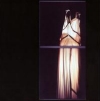 The third album from this semi-amorphous Newburyport, MA, band shows a new growth as well as a newfound playfulness, making for a thoroughly enjoyable listening experience. Regular partners-in-crime Juliet Nelson and JR Gallagher rejoin Dylan Metrano in the studio to make some moving songs based upon contemporary literature and music but completely their own, with the exception of a stunning Wolf Colonel cover that they almost steal from its originators. Wolf Colonel's Jason Anderson lends his multiple talents to the record, as does Marc Gartman, allowing the music to move in many directions at once on a whim. The result is a braver, rawer, and more passionate Tiger Saw with the power to either decimate or reduce to tears anyone who listens. The dueling/blending voices of Metrano and Nelson are to die for, as always, and Anderson even joins in here and there, adding a new dimension to the vocal presence. Where there is a real difference is in the music, as the melodies and presence of these songs is more confrontational than the band has shown in the past. It's almost as though they are reinvigorated or reinspired in their craft, taking more chances and feeling less dependent on their past. Even the mixing seems to bring everything more to the forefront, and right at the listener, conveying an emotionally charged reality. The first few songs on the album sway from themes light-hearted to contemplative and near bitter to somber, and there's nary a misstep to be found. This is well-crafted art, created and presented with a pure heart bent on the task, projecting whatever it feels at that moment. The song where I completely became immersed in the wonder of it all was the simple and gorgeous instrumental "West of the Sun," with a crescendo that almost eclipses the rest of the record. To think that this band has that power even without their much-lauded singing ability was pleasing, to say the least. With all of the different layers Tiger Saw peeled off to reach this point, they're bound to uncover more magic underneath. For this time, there's plenty to go around. - Rob Devlin
The third album from this semi-amorphous Newburyport, MA, band shows a new growth as well as a newfound playfulness, making for a thoroughly enjoyable listening experience. Regular partners-in-crime Juliet Nelson and JR Gallagher rejoin Dylan Metrano in the studio to make some moving songs based upon contemporary literature and music but completely their own, with the exception of a stunning Wolf Colonel cover that they almost steal from its originators. Wolf Colonel's Jason Anderson lends his multiple talents to the record, as does Marc Gartman, allowing the music to move in many directions at once on a whim. The result is a braver, rawer, and more passionate Tiger Saw with the power to either decimate or reduce to tears anyone who listens. The dueling/blending voices of Metrano and Nelson are to die for, as always, and Anderson even joins in here and there, adding a new dimension to the vocal presence. Where there is a real difference is in the music, as the melodies and presence of these songs is more confrontational than the band has shown in the past. It's almost as though they are reinvigorated or reinspired in their craft, taking more chances and feeling less dependent on their past. Even the mixing seems to bring everything more to the forefront, and right at the listener, conveying an emotionally charged reality. The first few songs on the album sway from themes light-hearted to contemplative and near bitter to somber, and there's nary a misstep to be found. This is well-crafted art, created and presented with a pure heart bent on the task, projecting whatever it feels at that moment. The song where I completely became immersed in the wonder of it all was the simple and gorgeous instrumental "West of the Sun," with a crescendo that almost eclipses the rest of the record. To think that this band has that power even without their much-lauded singing ability was pleasing, to say the least. With all of the different layers Tiger Saw peeled off to reach this point, they're bound to uncover more magic underneath. For this time, there's plenty to go around. - Rob Devlin
samples:
black dice, "creature comforts"
DFA (US) /
Fat Cat (UK)
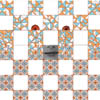 It's so difficult not to daydream during the summer months. The weather's warm and the office or an urban jungle is the last place anybody would want to be: gasping for air through the heavy smog when it seems like everybody else in the world's on vacation. Black Dice's latest album is no help. The sounds on Creature Comforts are easily some of the most intoxicating imaginable, with delicate guitar, sonic warbles, birds and bubble pops, and delay effects that take a life completely independent of the input. For the first few tracks, I'm on a remote tropical beach, somewhere between consiousness and unconsciounsess where sights and sounds completely blur due to the overwhelming heat or something funky in the drink. By the fourth song, "Creature," Black Dice introduce steady pulsing beats, but not the type that get blasted on a boombox of some girl in a bikini on rollerskates passing by, but the nightlife of a unique culture far removed from what the tourists can find. A brief interlude and the 15+ minute "Skeleton" washes in, peaceful and slow-paced, with consonant guitar strums, like staring at the ocean under a moonlit sky. Halfway through, the night sky is illuminated with a sparkling shower of either bats or shooting stars, I can't figure it out. "Schwip Schwap" is brief transition, changing courses a few times in two minutes, like a walk back to camp as the smooth beach sand between the feet becomes pavement and a pause is taken to put sandals back on. It gracefully leads into the album's closer, "Night Flight," with a quiet intro, then a roar of an engine, and it's off into the darkness on the back of a scooter with the wind blowing through the hair. So, if this album is playing and I'm asleep at my desk, don't wake me, because your face in this place is the last thing I want to see. - Jon Whitney
It's so difficult not to daydream during the summer months. The weather's warm and the office or an urban jungle is the last place anybody would want to be: gasping for air through the heavy smog when it seems like everybody else in the world's on vacation. Black Dice's latest album is no help. The sounds on Creature Comforts are easily some of the most intoxicating imaginable, with delicate guitar, sonic warbles, birds and bubble pops, and delay effects that take a life completely independent of the input. For the first few tracks, I'm on a remote tropical beach, somewhere between consiousness and unconsciounsess where sights and sounds completely blur due to the overwhelming heat or something funky in the drink. By the fourth song, "Creature," Black Dice introduce steady pulsing beats, but not the type that get blasted on a boombox of some girl in a bikini on rollerskates passing by, but the nightlife of a unique culture far removed from what the tourists can find. A brief interlude and the 15+ minute "Skeleton" washes in, peaceful and slow-paced, with consonant guitar strums, like staring at the ocean under a moonlit sky. Halfway through, the night sky is illuminated with a sparkling shower of either bats or shooting stars, I can't figure it out. "Schwip Schwap" is brief transition, changing courses a few times in two minutes, like a walk back to camp as the smooth beach sand between the feet becomes pavement and a pause is taken to put sandals back on. It gracefully leads into the album's closer, "Night Flight," with a quiet intro, then a roar of an engine, and it's off into the darkness on the back of a scooter with the wind blowing through the hair. So, if this album is playing and I'm asleep at my desk, don't wake me, because your face in this place is the last thing I want to see. - Jon Whitney
samples:
Andrew Chalk, "Fall in the Wake of a Flawless Landscape"
Three Poplars
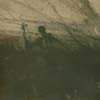 It's been about five years since Andrew Chalk released his last solo effort, Over the Edges. His newest album comes as a vinyl-only release in an edition of 600 copies and not only does it look excellent (the sleeve artwork and the little flourishes on the record itself are gorgeous), but it sounds absolutely majestic. Split into two side-long pieces, Fall in the Wake of a Flawless Landscape carries with it the same foreboding energy that 1999's Over the Edges had, but it also resonates a ubiquitous calm that feels something like floating on ocean waves. Chalk's drones stay consistent throughout, relenting only to reveal more ominous tones under the dominant ring and drag of some timeless organ. The blurred images of the cover bring to mind a haunted spectre traversing some dark plain covered in tall grasses and of unbearable size; no matter how far that figure travels, the disqueting feeling of infinity is always present. Anxiety dominates the album, but so does a sense of privacy. Throughout, I imagine myself as this fictional pilgrim caught up in some endless search and, at the same time, that long and lonely feeling opens up some kind of inner peace, as though I am happy being alone and lost. So far as the sound goes, Chalk's compositional skills are unbeatable. Whenever the sounds become too ghastly or alarming, Chalk shifts gears and somehow inverts them into striking and monumental sounds of great beauty. Strings buzz, organs disintegrate, and whales bellow their songs over this landscape, all in a harmony that defies any easy explanation. This is what Chalk does best though: defy easy anything. Fall in the Wake... occupies several emotional and atmospheric worlds at once: the dense and open, the terrifying and the awesome, and the contradictory positions of both quiet and loud. It's a difficult middle ground that Chalk finds and weaves into music and it's a difficult middle ground that few others can accomplish. This release has me anxiously awaiting the next Mirror album and has put me in the unenviable position of wanting more solo Chalk music: five years between albums is too long to wait. - Lucas Schleicher
It's been about five years since Andrew Chalk released his last solo effort, Over the Edges. His newest album comes as a vinyl-only release in an edition of 600 copies and not only does it look excellent (the sleeve artwork and the little flourishes on the record itself are gorgeous), but it sounds absolutely majestic. Split into two side-long pieces, Fall in the Wake of a Flawless Landscape carries with it the same foreboding energy that 1999's Over the Edges had, but it also resonates a ubiquitous calm that feels something like floating on ocean waves. Chalk's drones stay consistent throughout, relenting only to reveal more ominous tones under the dominant ring and drag of some timeless organ. The blurred images of the cover bring to mind a haunted spectre traversing some dark plain covered in tall grasses and of unbearable size; no matter how far that figure travels, the disqueting feeling of infinity is always present. Anxiety dominates the album, but so does a sense of privacy. Throughout, I imagine myself as this fictional pilgrim caught up in some endless search and, at the same time, that long and lonely feeling opens up some kind of inner peace, as though I am happy being alone and lost. So far as the sound goes, Chalk's compositional skills are unbeatable. Whenever the sounds become too ghastly or alarming, Chalk shifts gears and somehow inverts them into striking and monumental sounds of great beauty. Strings buzz, organs disintegrate, and whales bellow their songs over this landscape, all in a harmony that defies any easy explanation. This is what Chalk does best though: defy easy anything. Fall in the Wake... occupies several emotional and atmospheric worlds at once: the dense and open, the terrifying and the awesome, and the contradictory positions of both quiet and loud. It's a difficult middle ground that Chalk finds and weaves into music and it's a difficult middle ground that few others can accomplish. This release has me anxiously awaiting the next Mirror album and has put me in the unenviable position of wanting more solo Chalk music: five years between albums is too long to wait. - Lucas Schleicher
samples:
DNA, "DNA ON DNA"
No More
 DNA played angular freak noise for spastic punks; fiercely intellectual, bordering on the psychotic. The Brazilian-born Arto Lindsay played guitar in the most anti-musical, reptilian brand of non-funk that had ever been heard outside of music hour at the local laughing academy, barking and shrieking like a constipated Artaud in clipped fragments of opaque poeticism. Ikue Mori played a drum set with big taiko sticks in a manner that suggested neo-tribalism but delivered cold, muscular propulsion. Robin Crutchfield's synths unsympathetically reveled in circular insanity, and later, Tim Wright's bass danced around flittingly like a dying mosquito, never finding a foothold, falling over itself in a mad rush to the end of the song. Sure, it's noise, but noise as precise and deadly as DNA's deserves your attention. DNA were the longest-lived of the brief No Wave scene in late-70's New York City. Highlighted on the famous Eno-produced No New York compilation, DNA always seemed like the most vital of this grouping of high-energy avant-punks. Their four tracks from that compilation, as well as 28 other studio and live tracks, many rare and previously unreleased, comprise DNA on DNA, this definitive new collection from No More Records. Critics often lazily attempt to place DNA squarely in line with the previous generation of boundary-pushing jazz-improv mavericks like Albert Ayler and Sonny Sharrock (and the liner notes to this collection are no exception), but I've always felt that DNA have much more in common with Damo Suzuki-era Can freakouts, their influence continuing in a straight line to Japanese freak-metal noise outfits like the Boredoms and Ruins. DNA sit more comfortably on the margins, unabsorbed into an easy critical assessment of their music as some kind of punk-improv. Believe me, this stuff is much more entertaining when you back off from neatly-considered definitions and surrender to its oddness and angularity. For anyone who has collected other reissues of the band over the years, all the familiar stuff is here: the superlative debut "You and You" single, the vaguely teutonic keyboard-driven NNY stuff, and the jagged, chaotic intensity of A Taste of DNA. But where this collection shines is in the inclusion of the live material and never-released studio outtakes like "Grapefruit," a five-minute nervous breakdown on record, all non-verbal chanting and instinctively structured rock abstraction. Surprising, since previously, the world had never heard a DNA song that exceeded the three-minute mark. There are five tracks of alarmingly evocative instrumentals meant to accompany a theater piece. "Egomaniac's Kiss" should be, but is never mentioned in the same breath with the classics of the punk era, a miniature epic of raw, aggressive emotion and minimal rock construction. Put simply, DNA were a great band, and this indispensable document proves it. - Jonathan Dean
DNA played angular freak noise for spastic punks; fiercely intellectual, bordering on the psychotic. The Brazilian-born Arto Lindsay played guitar in the most anti-musical, reptilian brand of non-funk that had ever been heard outside of music hour at the local laughing academy, barking and shrieking like a constipated Artaud in clipped fragments of opaque poeticism. Ikue Mori played a drum set with big taiko sticks in a manner that suggested neo-tribalism but delivered cold, muscular propulsion. Robin Crutchfield's synths unsympathetically reveled in circular insanity, and later, Tim Wright's bass danced around flittingly like a dying mosquito, never finding a foothold, falling over itself in a mad rush to the end of the song. Sure, it's noise, but noise as precise and deadly as DNA's deserves your attention. DNA were the longest-lived of the brief No Wave scene in late-70's New York City. Highlighted on the famous Eno-produced No New York compilation, DNA always seemed like the most vital of this grouping of high-energy avant-punks. Their four tracks from that compilation, as well as 28 other studio and live tracks, many rare and previously unreleased, comprise DNA on DNA, this definitive new collection from No More Records. Critics often lazily attempt to place DNA squarely in line with the previous generation of boundary-pushing jazz-improv mavericks like Albert Ayler and Sonny Sharrock (and the liner notes to this collection are no exception), but I've always felt that DNA have much more in common with Damo Suzuki-era Can freakouts, their influence continuing in a straight line to Japanese freak-metal noise outfits like the Boredoms and Ruins. DNA sit more comfortably on the margins, unabsorbed into an easy critical assessment of their music as some kind of punk-improv. Believe me, this stuff is much more entertaining when you back off from neatly-considered definitions and surrender to its oddness and angularity. For anyone who has collected other reissues of the band over the years, all the familiar stuff is here: the superlative debut "You and You" single, the vaguely teutonic keyboard-driven NNY stuff, and the jagged, chaotic intensity of A Taste of DNA. But where this collection shines is in the inclusion of the live material and never-released studio outtakes like "Grapefruit," a five-minute nervous breakdown on record, all non-verbal chanting and instinctively structured rock abstraction. Surprising, since previously, the world had never heard a DNA song that exceeded the three-minute mark. There are five tracks of alarmingly evocative instrumentals meant to accompany a theater piece. "Egomaniac's Kiss" should be, but is never mentioned in the same breath with the classics of the punk era, a miniature epic of raw, aggressive emotion and minimal rock construction. Put simply, DNA were a great band, and this indispensable document proves it. - Jonathan Dean
samples:
Sciajno/Prins, "The D&B Album"
Bowindo
 Alhough it does little to follow through on its genre-addressing title, cheeky or otherwise, The D&B Album still emerges as one of Bowindo's more accessible releases to date. From the playful motorik pulsings of the opening "Cascocity" it's clear that the musicians choose not the weighted expressionism or colorful electroacoustics that characterized the label's previous output and will opt instead for "electro" alone, forging a new brand of body music for new kinds of bodies. Domenico Sciajno and Gert-Jan Prins (or "Do shine O." and "Prinsjan" as their adopted b-boy names read) improvise with small electronics, computer, and radio manipulations pulling together arrhythmic roller coasters of clipped, squelching highs and dizzy, rumbling lows, not dance music by any means, but a lot of fun regardless. The one reference point I can imagine would be Nerve Net Noise's music, for as synthetic and aloof as The D&B Album sounds, it can never be called faceless, always bursting with enough cartoon-ish energy to push for the next nauseating, limb-shaking, speaker-busting plateau. The scattered references to "acceptable" electronic musicianship, a few straight-ahead breaks, down-beat bass patterns, and antique modal synth lines, exist submerged within a surface scurry of digital scraps that never feels too indulgent for justification in the disc's humorous undertone or simple, rump-shaking oddity. For their part, Prins' static-coated radio captures help to emphasize the music's reclamation of the friendly or commonplace within otherwise alienating circumstances. And if one thing must be taken away from The D&B Album it might be this idea, that through their chiding title, invented alter-egos, and schizophrenic presentation, the artists compile a subtle statement about the tendency towards depersonalization in current majority of experimental or improvised electronic music. It is more tempting, however, to forget the commentary altogether and just nod along with this wackiness, probably the more progressive attitude anyway.
- Andrew Culler
Alhough it does little to follow through on its genre-addressing title, cheeky or otherwise, The D&B Album still emerges as one of Bowindo's more accessible releases to date. From the playful motorik pulsings of the opening "Cascocity" it's clear that the musicians choose not the weighted expressionism or colorful electroacoustics that characterized the label's previous output and will opt instead for "electro" alone, forging a new brand of body music for new kinds of bodies. Domenico Sciajno and Gert-Jan Prins (or "Do shine O." and "Prinsjan" as their adopted b-boy names read) improvise with small electronics, computer, and radio manipulations pulling together arrhythmic roller coasters of clipped, squelching highs and dizzy, rumbling lows, not dance music by any means, but a lot of fun regardless. The one reference point I can imagine would be Nerve Net Noise's music, for as synthetic and aloof as The D&B Album sounds, it can never be called faceless, always bursting with enough cartoon-ish energy to push for the next nauseating, limb-shaking, speaker-busting plateau. The scattered references to "acceptable" electronic musicianship, a few straight-ahead breaks, down-beat bass patterns, and antique modal synth lines, exist submerged within a surface scurry of digital scraps that never feels too indulgent for justification in the disc's humorous undertone or simple, rump-shaking oddity. For their part, Prins' static-coated radio captures help to emphasize the music's reclamation of the friendly or commonplace within otherwise alienating circumstances. And if one thing must be taken away from The D&B Album it might be this idea, that through their chiding title, invented alter-egos, and schizophrenic presentation, the artists compile a subtle statement about the tendency towards depersonalization in current majority of experimental or improvised electronic music. It is more tempting, however, to forget the commentary altogether and just nod along with this wackiness, probably the more progressive attitude anyway.
- Andrew Culler
samples:
Fanny, "Revelry & Decadence as the Right of Slaves"
Mirex
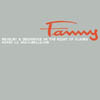 As I mentioned in my review of the Xanopticon album some months back, breakcore seems like the most probable style of music to take over the mantle of IDM. Considering the recent Revelry & Decadence as the Right of Slaves: the process-driven pseudo academia calling itself music these days seems closer to dying out in some mathematical tar pit. Taking a unique and harsh approach to this still-blossoming subgenre, Fanny eschews the post-rave trappings and pop-culture plunderphonics of many of his contemporaries on his second full-length album for Ant-Zen sublabel Mirex. Instead of hyper-jungle cut-ups and snippets of rap singles, listeners can expect an alarmingly abrasive cacophony that astonishes, aggravates, and entertains all at once. Lunatic tracks like "Salome," "Bacchanale," and "Wine, Women & Sin" abuse and dissect drum loops to a point where they are no longer recognizable nor decipherable. Keeping with the infamous depravity and lunacy of its namesake, "Caligula" initially bares its teeth with a vicious noisy rhythm pattern before shifting gears dramatically towards a more quirky tribal sound. "Pyramids Of Mars" showcases some bombastic militant drumming alongside its sliced breakbeats and heavily distorted samples. Among the equally eclectic and eccentric 20 tracks here are a handful of shorter pieces that provide amusement and confusion, such as the fractured Eastern grooves of "300lb Transvestite Bellydance" and the cartoonish freakout "Kaliyuga." While many current electronic musicians continue to bury their noses deeper and deeper into books and software, Fanny gives all that one giant middle finger salute and keeps the manic free spirit of acts like Aphex Twin alive. - Gary Suarez
As I mentioned in my review of the Xanopticon album some months back, breakcore seems like the most probable style of music to take over the mantle of IDM. Considering the recent Revelry & Decadence as the Right of Slaves: the process-driven pseudo academia calling itself music these days seems closer to dying out in some mathematical tar pit. Taking a unique and harsh approach to this still-blossoming subgenre, Fanny eschews the post-rave trappings and pop-culture plunderphonics of many of his contemporaries on his second full-length album for Ant-Zen sublabel Mirex. Instead of hyper-jungle cut-ups and snippets of rap singles, listeners can expect an alarmingly abrasive cacophony that astonishes, aggravates, and entertains all at once. Lunatic tracks like "Salome," "Bacchanale," and "Wine, Women & Sin" abuse and dissect drum loops to a point where they are no longer recognizable nor decipherable. Keeping with the infamous depravity and lunacy of its namesake, "Caligula" initially bares its teeth with a vicious noisy rhythm pattern before shifting gears dramatically towards a more quirky tribal sound. "Pyramids Of Mars" showcases some bombastic militant drumming alongside its sliced breakbeats and heavily distorted samples. Among the equally eclectic and eccentric 20 tracks here are a handful of shorter pieces that provide amusement and confusion, such as the fractured Eastern grooves of "300lb Transvestite Bellydance" and the cartoonish freakout "Kaliyuga." While many current electronic musicians continue to bury their noses deeper and deeper into books and software, Fanny gives all that one giant middle finger salute and keeps the manic free spirit of acts like Aphex Twin alive. - Gary Suarez
samples:
aMute, "A Hundred Dry Trees"
Intr_version
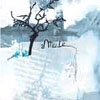 This is an example of a full-length that perfectly, if predictably, fulfills my expectations. aMute's track on last year's Intr_version compilation formed the undeniable centerpiece of the disc. If not the most showy piece, it was certainly the most effective, dropping in from behind the preceding track almost invisibly and, through graceful crescendos, sucking the entire sampler into its icy expanse, enough to haunt the remainder of the disc and nearly summarize the label's melancholic ethos in a eight short minutes. For his debut album, Jérôme Deuson provides not only an extended version of that song, "Aux creux des vagues, mon visage," but also seven others that match its mood easily, creating a work that seems cut from the same graying, crystalline tapestry, full of bristly folds and wide, smothering fuzz. Deuson's technique is nothing shocking, an intricate, but not over-complex entangling of effects-heavy guitar, processed feedback noise, and windy, chime-ful ambience, all allowed to dive and swoop through layers of minimal bass and the smallest of percussive clicks. None of the tracks are particularly grounded; rather they float in a structure-less haze that serves the cold, discreet passages conjured by aMute's harmonic sensibility, the same economized, somber aesthetic of his labelmates Joshua Treble, Mitchell Akiyama, and The Beans. Like his friends, Deuson's approach is geared away from bending his guitar towards extremes in distortion or processed disintegration and more towards crafting careful, meaningful builds via simple melodic strands with clear resolutions. The frosty ambiance, of scattered windchimes and stuttering drones, carries these tracks into the oblivion they require; however, Deuson's playing maintains a directness that attaches a cinematic feel throughout. Certain left-field inclusions, like muffled vocal samples and a track of naked French speech, add to the feeling of remove that I (perhaps too quickly) tend to associate with some set of fixed visual correspondents. This might form my one criticism of A Hundred Day Trees, that, for all its sad majesty, the album seems a bit limited in its expressive power, leaving me in the same place after each listen. It could be the relative homogeneity of the tracks or the similarity to other recent releases by the label, not bad qualities at all, just not enough to prove that aMute doesn't have better in store for next time.
- Andrew Culler
This is an example of a full-length that perfectly, if predictably, fulfills my expectations. aMute's track on last year's Intr_version compilation formed the undeniable centerpiece of the disc. If not the most showy piece, it was certainly the most effective, dropping in from behind the preceding track almost invisibly and, through graceful crescendos, sucking the entire sampler into its icy expanse, enough to haunt the remainder of the disc and nearly summarize the label's melancholic ethos in a eight short minutes. For his debut album, Jérôme Deuson provides not only an extended version of that song, "Aux creux des vagues, mon visage," but also seven others that match its mood easily, creating a work that seems cut from the same graying, crystalline tapestry, full of bristly folds and wide, smothering fuzz. Deuson's technique is nothing shocking, an intricate, but not over-complex entangling of effects-heavy guitar, processed feedback noise, and windy, chime-ful ambience, all allowed to dive and swoop through layers of minimal bass and the smallest of percussive clicks. None of the tracks are particularly grounded; rather they float in a structure-less haze that serves the cold, discreet passages conjured by aMute's harmonic sensibility, the same economized, somber aesthetic of his labelmates Joshua Treble, Mitchell Akiyama, and The Beans. Like his friends, Deuson's approach is geared away from bending his guitar towards extremes in distortion or processed disintegration and more towards crafting careful, meaningful builds via simple melodic strands with clear resolutions. The frosty ambiance, of scattered windchimes and stuttering drones, carries these tracks into the oblivion they require; however, Deuson's playing maintains a directness that attaches a cinematic feel throughout. Certain left-field inclusions, like muffled vocal samples and a track of naked French speech, add to the feeling of remove that I (perhaps too quickly) tend to associate with some set of fixed visual correspondents. This might form my one criticism of A Hundred Day Trees, that, for all its sad majesty, the album seems a bit limited in its expressive power, leaving me in the same place after each listen. It could be the relative homogeneity of the tracks or the similarity to other recent releases by the label, not bad qualities at all, just not enough to prove that aMute doesn't have better in store for next time.
- Andrew Culler
samples:
Wilt, "As Giants Watch Over Us"
Ad Noiseam
 Good or bad, dark ambient albums rarely get much of a rise out of me. While I can usually appreciate an artist's attempts at creating a certain mood or feeling, I have heard enough "haunting sonic tapestries" over the years that it takes a lot to impress me. The glut of releases from obviously untalented bedroom producers in this genre certainly doesn't give a reason to get excited. While by no means a revolutionary work, As Giants Watch Over Us, the third Ad Noiseam release from James Keeler, benefits from its willingness to use intrusive sounds among its more subdued spooky drones. "Empire Of The Snake" opens this lengthy album with ominous textures peppered with sudden bursts and prolonged sections of swirling, unruly synthesized noise. Breaking from this style, the title track exudes a type of frozen paranoia amid the screeching, voice snippets, and sampled dramatic symphonies. "The Fiddler And The Fool" creeps along much like an updated version of a old horror movie score, shifting gears around three minutes in to dissonance and backwards loops. The emotive and atmospheric "Reversing Magnetism" plays out beautifully, with delayed and stretched tones morphing over clicking static and low bass. Running over 70 minutes long, at least a few of these thirteen somewhat similar tracks could have been whittled down or cut altogether. Nonetheless, both the Cold Meat Industry set as well as sound design connoisseurs may find some reward from As Giants Watch Over Us. - Gary Suarez
Good or bad, dark ambient albums rarely get much of a rise out of me. While I can usually appreciate an artist's attempts at creating a certain mood or feeling, I have heard enough "haunting sonic tapestries" over the years that it takes a lot to impress me. The glut of releases from obviously untalented bedroom producers in this genre certainly doesn't give a reason to get excited. While by no means a revolutionary work, As Giants Watch Over Us, the third Ad Noiseam release from James Keeler, benefits from its willingness to use intrusive sounds among its more subdued spooky drones. "Empire Of The Snake" opens this lengthy album with ominous textures peppered with sudden bursts and prolonged sections of swirling, unruly synthesized noise. Breaking from this style, the title track exudes a type of frozen paranoia amid the screeching, voice snippets, and sampled dramatic symphonies. "The Fiddler And The Fool" creeps along much like an updated version of a old horror movie score, shifting gears around three minutes in to dissonance and backwards loops. The emotive and atmospheric "Reversing Magnetism" plays out beautifully, with delayed and stretched tones morphing over clicking static and low bass. Running over 70 minutes long, at least a few of these thirteen somewhat similar tracks could have been whittled down or cut altogether. Nonetheless, both the Cold Meat Industry set as well as sound design connoisseurs may find some reward from As Giants Watch Over Us. - Gary Suarez
samples:
Nautical Almanac, "Rooting for the Microbes"
Load
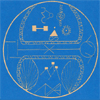 The liner notes read "No computers or electricity were employed in the music making process." How that is possible baffles me, so I figure it must be a joke or a half-truth. On the other hand, how a record was made rarely matters to me more than how it comes out sounding and Rooting for the Microbes is a bit of a mixed bag in that respect. A consistent barrage of wailing scratches and interstellar waves covers up, for a majority of the album, strangely distorted natural sounds like accordians, bells, clocks, and laughter. This combination of failing equipment and indefinite references to some kind of ghost world run by clowns stays fairly interesting from beginning to start; but Nautical Alamanac's formula rarely changes. The rigid structure of each song somehow becomes apparent through all the smoke and noise half way through the album and makes the remainder feel like a repeat of the first filtered through some altered dimesion. I can't help but think that this random assortment of sounds is somehow comedic at its heart, maybe just a bit surrealist. The assault of scratches, wheezes, and whines are never threatening and, even at loud volumes, never inspire any kind of madness or unbearable torment. The spasmodic current of the album never allows for a consistency to build; any residue left behind by one sound is immediately destroyed by the following. "Cross Dementia" does nothing short of spread laughter and the closing "Ocularis" only winds everything down to a calm and and slightly more silent end. So what's missing? When the hidden track(s?) finally end and I'm left sitting in my room, I feel like Nautical Almanac forgot some important ingredients in their noise soup. For all their wackiness, Nautical Almanac somehow manages to tell the same joke over and over. Where another group or individual might succeed in making nonsense noise by severely widening the sound palette, Nautical Almanac stays static, relying on the gimmick of "no computers, no electricity" (if that is actually the case) to carry the album. It boils down to this: the noise just sounds like noise. It has no compositional value and just seems like a hindrance on some of the other sounds that are trying to be heard. Had some more variety been packed into the noise end of the album and then combined with all those excellent samples of the recognizable world, Rooting for the Microbes would have come away a lot more addicting than it is now. - Lucas Schleicher
The liner notes read "No computers or electricity were employed in the music making process." How that is possible baffles me, so I figure it must be a joke or a half-truth. On the other hand, how a record was made rarely matters to me more than how it comes out sounding and Rooting for the Microbes is a bit of a mixed bag in that respect. A consistent barrage of wailing scratches and interstellar waves covers up, for a majority of the album, strangely distorted natural sounds like accordians, bells, clocks, and laughter. This combination of failing equipment and indefinite references to some kind of ghost world run by clowns stays fairly interesting from beginning to start; but Nautical Alamanac's formula rarely changes. The rigid structure of each song somehow becomes apparent through all the smoke and noise half way through the album and makes the remainder feel like a repeat of the first filtered through some altered dimesion. I can't help but think that this random assortment of sounds is somehow comedic at its heart, maybe just a bit surrealist. The assault of scratches, wheezes, and whines are never threatening and, even at loud volumes, never inspire any kind of madness or unbearable torment. The spasmodic current of the album never allows for a consistency to build; any residue left behind by one sound is immediately destroyed by the following. "Cross Dementia" does nothing short of spread laughter and the closing "Ocularis" only winds everything down to a calm and and slightly more silent end. So what's missing? When the hidden track(s?) finally end and I'm left sitting in my room, I feel like Nautical Almanac forgot some important ingredients in their noise soup. For all their wackiness, Nautical Almanac somehow manages to tell the same joke over and over. Where another group or individual might succeed in making nonsense noise by severely widening the sound palette, Nautical Almanac stays static, relying on the gimmick of "no computers, no electricity" (if that is actually the case) to carry the album. It boils down to this: the noise just sounds like noise. It has no compositional value and just seems like a hindrance on some of the other sounds that are trying to be heard. Had some more variety been packed into the noise end of the album and then combined with all those excellent samples of the recognizable world, Rooting for the Microbes would have come away a lot more addicting than it is now. - Lucas Schleicher
samples:
Park Avenue Music, "For Your Home or Office"
Clairecords
 Glitchy electronic music about the problems people face in a modern society from a husband and wife team sounds frighteningly close to a Will Ferrell-based SNL skit, but this new EP fits that description, and the results are ripe for absorption. Keyboards and vocals by Jeannette Faith are the base, and then Wes Steed takes it to a whole other level with computers and homemade synths, resulting in a sound that is not just songs, it's a whole atmosphere. The techniques are used to great effect in creating a feeling of absolute detachment, like a dependence on computers for everything in life just so it doesn't require effort. The titles could be articles in Reader's Digest or some corporate pamphlet, and as such they belie the elegance of what's inside. When sounds escape the speakers, though, the mood is realized immediately, and an almost menial state of mind takes shape, like drone-esque office work. Troubadours used to sing about the struggle of the working man #&151; farmers, mechanics, factory workers — in angry tones meant to seize attention and change perceptions. This music is about the new under-appreciated or endangered species due to workload or stress at work or at home: the desk jockey. Rather than knock people out with brute force, this is a coaxing way of encouraging results. This is a new step for the duo, since their last album did not deal with themes anywhere near this, but they are perfectly suited to the task. Lyrics like "how many red eyes have you taken?" and "home is where the heart breaks" float out on Faith's processed voice, immediately cutting in and burrowing for a long stay. This is a bubbly and cheery-sounding record on the surface, but beneath it there is pain and longing. I couldn't stop listening, and it is now the preferred soundtrack for my mundane day job existence. Maybe I'll find the hidden message and escape, and I think that's exactly what these songs are meant to persuade the listener towards. - Rob Devlin
Glitchy electronic music about the problems people face in a modern society from a husband and wife team sounds frighteningly close to a Will Ferrell-based SNL skit, but this new EP fits that description, and the results are ripe for absorption. Keyboards and vocals by Jeannette Faith are the base, and then Wes Steed takes it to a whole other level with computers and homemade synths, resulting in a sound that is not just songs, it's a whole atmosphere. The techniques are used to great effect in creating a feeling of absolute detachment, like a dependence on computers for everything in life just so it doesn't require effort. The titles could be articles in Reader's Digest or some corporate pamphlet, and as such they belie the elegance of what's inside. When sounds escape the speakers, though, the mood is realized immediately, and an almost menial state of mind takes shape, like drone-esque office work. Troubadours used to sing about the struggle of the working man #&151; farmers, mechanics, factory workers — in angry tones meant to seize attention and change perceptions. This music is about the new under-appreciated or endangered species due to workload or stress at work or at home: the desk jockey. Rather than knock people out with brute force, this is a coaxing way of encouraging results. This is a new step for the duo, since their last album did not deal with themes anywhere near this, but they are perfectly suited to the task. Lyrics like "how many red eyes have you taken?" and "home is where the heart breaks" float out on Faith's processed voice, immediately cutting in and burrowing for a long stay. This is a bubbly and cheery-sounding record on the surface, but beneath it there is pain and longing. I couldn't stop listening, and it is now the preferred soundtrack for my mundane day job existence. Maybe I'll find the hidden message and escape, and I think that's exactly what these songs are meant to persuade the listener towards. - Rob Devlin
samples:
We know that our music picks may be somewhat challenging to find, which is why we have a community section which can be used to obtain nearly everything available on this site. |